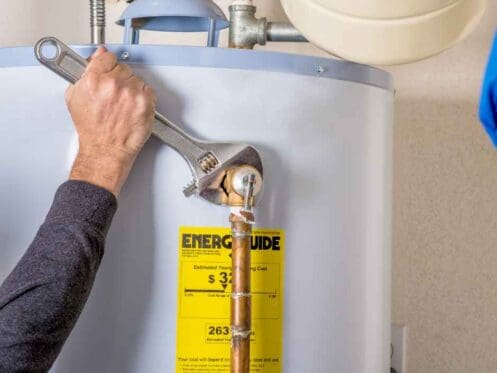A water heater is an essential home appliance that provides hot water for bathing, cooking, cleaning, and more. Understanding the lifespan of a water heater can help homeowners plan for maintenance, repairs, and eventual replacement. In this blog, we will explore the factors that influence how long water heaters last, signs that your water heater might be nearing the end of its life, and tips for extending its lifespan through proper maintenance and timely repairs.
Average Lifespan of Water Heaters
The lifespan of a water heater can vary based on several factors, including the type of water heater, the quality of the unit, and how well it is maintained. On average, traditional tank water heaters last about 8 to 12 years. Tankless water heaters, on the other hand, tend to have a longer lifespan, typically lasting around 20 years or more.
Factors Influencing Water Heater Lifespan
Type of Water Heater
- Tank Water Heaters: These are the most common type of water heaters and generally have a shorter lifespan due to the constant heating and cooling of the water in the tank, which can lead to wear and tear over time.
- Tankless Water Heaters: Also known as on-demand water heaters, these units heat water only when needed, which reduces the stress on the system and often results in a longer lifespan.
Quality of the Unit
The quality of the water heater plays a significant role in its longevity. Higher-quality units, often from reputable brands, are built to withstand the demands of daily use better than cheaper, lower-quality models.
Water Quality
The quality of the water in your area can impact the lifespan of your water heater. Hard water, which contains high levels of minerals, can cause sediment build-up inside the tank, leading to corrosion and reducing the efficiency and lifespan of the unit.
Usage
The more frequently a water heater is used, the shorter its lifespan is likely to be. Households with higher hot water demands may find that their water heaters need to be replaced more frequently than those with lower usage.
Maintenance
Regular maintenance is crucial for extending the lifespan of a water heater. Routine tasks such as flushing the tank to remove sediment build-up, inspecting and replacing the anode rod, and checking for leaks or other issues can help keep the unit running efficiently and prolong its life.
Signs Your Water Heater May Be Failing
Even with proper maintenance, all water heaters will eventually need to be replaced. Here are some signs that your water heater may be nearing the end of its life:
Age
If your water heater is approaching or has surpassed its expected lifespan (8-12 years for tank heaters, 20+ years for tankless heaters), it may be time to start considering a replacement.
Reduced Hot Water Supply
If you notice that your water heater is no longer providing as much hot water as it used to or if the water is not as hot as it should be, this could be a sign that the unit is failing.
Rusty Water
Rusty or discolored water coming from your hot water taps can indicate corrosion inside the tank. This is a serious issue that often means the water heater is near the end of its life.
Noise
Loud noises, such as banging, popping, or rumbling, coming from the water heater can be caused by sediment build-up in the tank. While flushing the tank can sometimes resolve this issue, persistent noise may indicate a more significant problem.
Leaks
Any signs of water leakage around the base of the water heater should be addressed immediately. Leaks can cause significant damage to your home and are often a sign that the tank is failing.
Extending the Lifespan of Your Water Heater
Proper maintenance and timely repairs can help extend the lifespan of your water heater. Here are some tips to keep your water heater in top condition:
Regular Maintenance
Schedule annual maintenance with a professional to inspect your water heater, flush the tank, check the anode rod, and ensure all components are functioning correctly. Regular maintenance can help catch potential issues early and prevent major problems down the line.
Water Softening
If you live in an area with hard water, consider installing a water softener. This can reduce the mineral content in the water, helping to prevent sediment build-up and corrosion inside the water heater.
Monitor Temperature Settings
Keep the thermostat set to a safe and efficient temperature (usually around 120 degrees Fahrenheit). Higher temperatures can increase the risk of damage and reduce the lifespan of the water heater.
Address Repairs Promptly
If you notice any issues with your water heater, such as leaks, noises, or reduced hot water supply, address them promptly. Small problems can quickly escalate into major issues if left unattended.
Call Charleston Heating & Air
Knowing how long water heaters last and understanding the factors that influence their lifespan can help you make informed decisions about maintenance, repairs, and replacements. By taking proactive steps to care for your water heater, you can ensure it provides reliable hot water for many years to come.
For expert water heater maintenance and repair services, contact Charleston Heating & Air today. Our experienced technicians can help keep your water heater in excellent condition, ensuring you have a reliable supply of hot water when you need it. Don’t wait until it’s too late—schedule your maintenance or repair service now!

